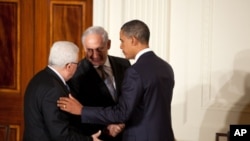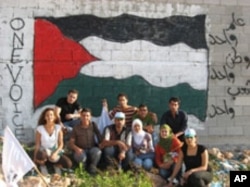Moribund. Fallow. Stale. These are the words observers are using to describe the Israeli-Palestinian peace process in 2011. Prime Minister Benjamin Netanyahu is reluctant to re-enter talks now that the Palestinian Authority and Hamas have formed a tenuous unity government. Likewise, Palestinian negotiators are skeptical that the Israeli government has the political will to halt settlements in the West Bank long enough to negotiate in good faith. Direct negotiations ceased back in September 2010 and agreement over so-called “final status” issues seems far over the horizon.
OneVoice CEO Howard Sumka talks about the role youth may play in reviving Middle East peace process:
Now, the Palestinians seem emboldened enough to go it on their own. The Palestinian Authority says it will go to the United Nations in September and ask for recognition of an independent state in the West Bank, Gaza Strip and East Jerusalem, a move opposed by both Israel and the United States.
This week, leaders in Ramallah confirmed they will seek recognition based on pre-1967 borders, membership in the United Nations and acknowledgment of the right to self-determination in accordance with the U.N. charter.
Sixty-five percent of Palestinians say they support the Palestinian Authority's plan to seek statehood in the United Nations this September, according to a new poll conducted by the Palestinian Center for Policy and Survey Research in Ramallah. As Palestinians consider their options to gain recognition from the world community on their own, many are asking if that is the right path to pursue without a negotiated settlement with Israel.
OneVoice Movement has been working for nearly a decade with both Israeli and Palestinian youth through town meetings and leadership programs to educate both sides on how key final-status issues can be addressed and how negotiations - if restarted - can lead to a lasting peace.
VOA’s Davin Hutchins sat down with OneVoice CEO Howard Sumka to talk about the role youth may play in reigniting a stagnant peace process between Israel and the Palestinians. Sumka spent 25 years with the United States Agency for International Development (USAID) before joining OneVoice, most recently as mission director of the West Bank and Gaza.
He says younger members of both Palestinian and Israeli society are not as jaded as older generations and the climate of youth empowerment in this age of the Arab Spring could inspire a real breakthrough.





